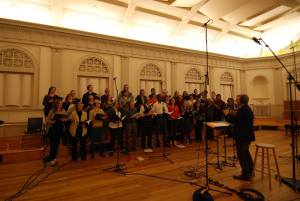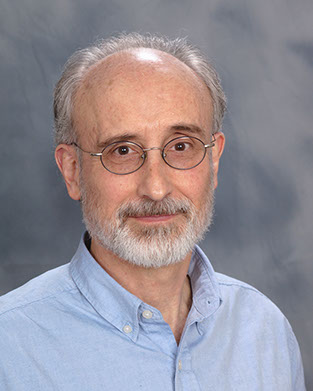 David Kirtley
David Kirtley
After an injury in 1982 ended his career as a modern dancer, David Kirtley focused on a new path as a self-taught composer. His efforts were rewarded when in 1987 he was granted a residency/fellowship from the Yellowsprings Institute in Pennsylvania for his piece, Songs for the Outcasts of Great Turtle’s Back, a song cycle recounting the great losses of life, land, and culture suffered by the American Indians. For the next nine years, Kirtley continued to compose while working as a waiter in Yellowstone National Park, where he deepened his interests in backpacking, botany, birding, geology, and anthropology. In time, urged on by a persistent feeling that formal training in composition would offer a necessary new direction, he enrolled at the University of Colorado Boulder, earning a BA in music (1999), and a MM in composition (2001). He had additional studies in composition at the Aspen Music Festival in the summers of 2001 and 2002.
Kirtley has received commissions from David Wheeler, shakuhachi; Erika Eckert, viola; Gilmar Goulart, marimba; Kazuhiro Miura, piano; the Playground Ensemble; Claricello; and others. His works have been performed at the 1998 International Shakuhachi Music Festival, the Aspen Music Festival, the Colorado New Music Festival, the 2004 NATS Convention, New York City Opera’s “VOX 2007: Showcasing American Composers” and at other venues in the United States, Brazil, Japan, and Europe.
His orchestra piece, Leaves falling from the Holy Tree; a work dedicated to the memory of Nicholas Black Elk, holy man of the Oglala Sioux, was recorded by the Kiev Philharmonic under the baton of Robert Ian Winstin and released in 2006 on volume 9 of ERM Media’s CD series Masterworks of the New Era. Subsequently, this recording was remastered, edited, and re-released by PARMA Recordings in September 2014 on the Navona Records CD album, Luminescence.
An avid hiker, nature lover, and world traveler, David Kirtley brings to his music a synthesis of Western musical traditions, sounds and impressions of nature, and elements drawn from indigenous musical traditions from around the world. Born in 1954 and raised in Bardstown, Kentucky, he now makes his home in Louisville, Colorado with his wife Mutsumi Moteki.
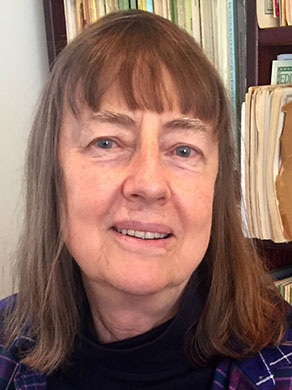 JOANNE D. CAREY
JOANNE D. CAREY
Coming from a family of artists, Joanne D. Carey's youthful years were spent absorbed with both music and art, the former via the piano and the latter with drawing. After initially majoring in art at San Jose State University, music ultimately won out. She returned to her studies as a piano major under Aiko Onisha at SJSU, changing to composition after two years under the guidance of professors Tikey Zes, Lou Harrison and Allen Strange.
Although she came late to music composition, once engaged, she pursued it with a passion. An abiding interest in all of Bach's music energized her studies and inspired her to join the California Bach Society, learning numerous Bach Cantatas in the process. This music became her quintessential ideal that she has tried to keep in mind in her own compositions. While studying with Lou Harrison, she performed with the SJSU Javanese Gamelan that he directed and learned techniques for expanding simple melodies into larger textures. Her music studies also introduced her to the rudiments of electronic music under the tutelage of Allen Strange. These interests coalesced in much of the music she created later with the help of sophisticated computer technology.
A decade as a visiting composer (1983-1993) with the Center for Computer Research in Music and Acoustics (CCRMA), Stanford University had a major influence on the direction of her musical energies. She completed three computer-generated compositions at CCRMA between 1984 and 1990: gamelan R-gong gong(1984), Clouds' Lament(1988) and Intonations of the Wind(1990). The latter two compositions developed detailed control of synthesized voices to produce ethereal choirs and unusual vocal effects.
During this period she became acquainted with Max Mathews, a prolific inventor and the first person to use computers to create music. He introduced her to his 'radio-baton', a controller that allows an electronic score to be performed live using sounds from a synthesizer. She found this new instrument intriguing and began a series of songs based on the poetry of Pablo Neruda that utilized some of it's unique possibilities, not least of which was the opportunity to create an individual, evocative musical ensemble for each song. The resulting "Three Spanish Songs"(1992-1994), Aqui, La Soledad and Gracias, for radio-baton and soprano have been performed in Europe, Asia, Latin America and various locations in the U.S. She returned to traditional instruments for her fourth Spanish Song, "Solo la Sombra," (2005, revised 2011) that is scored for cello, piano and soprano. A performance at the 2011 NACUSA Conference in Portland, Oregon titled "In Just Spring" can be seen on YouTube. She is currently working on acoustic versions of her "Three Spanish Songs".
Other radio-baton pieces include Adventures on a Theme (1997) for flute and radio baton and Sinfonia Concertante (2007) for French horn and radio-baton. The latter was prepared for chamber orchestra, recorded in 2009 and included on a CD compilation produced by PARMA and released by NAVONA in 2014.
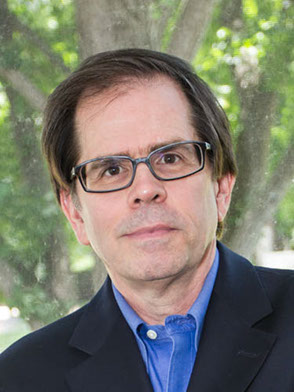 Timothy Kramer
Timothy Kramer
Timothy Kramer’s music reflects his fascination with motivic patterns, cyclical relationships, and musical fragments that unfold in a variety of changing speeds and textures. From pieces such as Mimetic Variations and Mosaics to Vanishing Perspectives and All in Golden Measure, his works often take their impetus from visual cues that generate a strong melodic component, a taut and sometimes dense rhythmic surface, and an integrated harmonic language. The interplay between background and foreground materials makes his music immediately approachable but with a rich structural layer. Critics have called his music “constantly inventive, clear, full of energy and admirably precise” (Greenberg - San Antonio Express News), “splendidly energetic and excellently crafted” (Reynish – WASBE Conference Review), “lively, intelligent, and blustery” (Burwasser – Fanfare), and “haunting and intensely moving” (Windeler – San Antonio Express News). Originally from Washington State, Kramer began studying the piano at a young age, and, although later trained as an organist and harpsichordist, he spent many years as a youth playing bass guitar in jazz and rock ensembles. He has been commissioned by and written for a wide variety of forces - from professional orchestras and soloists to high school bands and college choirs.
Kramer’s works have been performed widely throughout the United States and Canada - from Carnegie Hall to college campuses - and in Europe, South America, and Asia with performances by major symphony orchestras (Indianapolis, Detroit, Tacoma, San Antonio) chamber groups (North/South Consonance, SOLI Ensemble, ONIX Ensemble, Luna Nova, Detroit Chamber Winds and Strings) and university ensembles (Michigan State, Arizona State, Indiana University, Florida State, etc.). He has also been a featured composer at the San Antonio International Piano Competition, the Midwest International Clinic in Chicago, the Utah Arts Festival, and at national conferences of the American Guild of Organists, the Society for Electro-Acoustic Music in the United States, the American Choral Directors Association, the Society of Composers, Inc., and the College Music Society.
He has received grants from the Guggenheim Foundation, the National Endowment for the Arts, the MacDowell Colony, Meet the Composer, Broadcast Music, Inc., ASCAP, the American Guild of Organists, and the American Music Center among many others. His degrees are from Pacific Lutheran University (B.M.) and the University of Michigan (M.M. and D.M.A.), where he studied with William Albright, Leslie Bassett, William Bolcom, and George Wilson. He was also a Fulbright Scholar to Germany, studying with Martin Redel. Beginning in 1991 he taught at Trinity University in San Antonio for 19 years, where he also founded CASA (the Composers Alliance of San Antonio). In 2010 he accepted a post as Professor of Music and Chair of the Music Department at Illinois College in Jacksonville, Illinois, where he was recently named the Edward Capps Professor of Humanities. His works are published by Southern Music, Earnestly Music, Hinshaw, and Selah and are recorded on Calcante, North/South, and Capstone in addition to this PARMA recording.
More information can be found at timothykramer.com.
 Christopher J. Hoh
Christopher J. Hoh
Christopher J. Hoh hails from Pennsylvania and the Washington, DC area. He has participated in workshops with Jean Berger, Daniel Moe, Robert Page, and Mack Wilberg. He studied as a composition fellow with Alice Parker in 2014.
Chris’s recent commissions include American folksong settings for Alexandria, VA middle school choruses & piano and a cappella motets for a church on Capitol Hill in Washington, DC. The Stuttgart German-American chorus called on him to write an extended setting of the O Antiphons for choir & organ, which premiered in 2014. PROJECT:ENCORE endorsed his setting of the early American “Come Away to the Skies” in 2015, leading to several additional performances around the U.S. and commissions for more arrangements of American folk hymns. His song cycle “I Breathed A Song” for mezzo-soprano, baritone saxophone and piano premiered at Vienna’s Musikverein in 2011.
California's Meistersingers also requested new work from him: Shakespeare's "My Mistress' Eyes" for SATB a cappella (2014) and an SSATBB treatment of the 16th-Century carol “Ein Kind Geborn In Bethlehem” (2013). The William & Mary College choir reprised and took on tour his six-part “Angele Dei” in 2014-15, while Shepherd University asked him to re-arrange “Dona Nobis Pacem” for six-part male chorus. The Montana-based ensemble Musikanten, for whom he was composer-in-residence in 2008, has performed his work on several European tours. The last few years have seen premieres of Chris Hoh compositions in Colorado, Indiana, Massachusetts, and West Virginia, as well as Austria, Canada and Spain. His work has been published by Augsburg Fortress Press and Art of Sound Music.
Chris’s current projects include more part-songs on Shakespeare and old German texts, a symphony of Latin psalms for choir and orchestra, and flute/horn/piano arrangements of less-known Christmas carols. He also edits neglected works from the European renaissance (e.g. Caurroy, Monte, Prætorius, Sweelinck) and the New World (Billings, Beach, Parker, Salazar) for performance today.
In addition to recordings with Navona/PARMA, his compositions are found on ERM Media’s “Made in the Americas, Vol. 1” CD and Phoenix Classical’s “Undiscovered Choral Gems.” Chris Hoh graduated from Georgetown University in international affairs. He served in the U.S. Foreign Service for over 30 years and is now a Senior Adviser at the Department of State.
Scores, audio and information about Chris’s compositions may be found on his website, www.HohMadeMusic.com and J.W. Pepper’s MyScore.
Click here to view Come Now and Celebrate and Behold That Star composed by Christopher Hoh on Navona Records 2016 holiday release DASHING.
Performers
 Jennifer Bird, soprano
Jennifer Bird, soprano
American soprano Jennifer Bird enjoys a busy and varied singing career in the US and Europe, having built a reputation as a charismatic, intelligent and versatile performer of more than 50 roles in opera, operetta and musical theater, as well as much of the standard oratorio and concert literature. As the recipient of a Rotary International Ambassadorial Scholarship, Jennifer studied in Germany in the Opernklasse of the Hamburg Musikhochschule, where she joined the vocal studio of renowned soprano Judith Beckmann. Soon thereafter she began singing at the Landestheater Coburg and then at the Bremer Theater where she became a pillar of the soloist ensemble, singing major roles in the lyric and lyric-coloratura soprano repertory and, in Coburg, twice earning the Audience Favorite Prize. Engagements followed at the Vienna Volksoper, Nationaltheater Mannheim, Theater Bonn, Theater Chemnitz, among others. Highlights have included the title roles in Lulu and Lucia di Lammermoor, Marguerite in Faust, Gilda in Rigoletto, Violetta in La traviata, and Konstanze in Die Entführung aus dem Serail.
Much in demand as a recitalist and concert singer, Jennifer has been the soprano soloist in Messiah with the Berlin Symphony Orchestra, in Dvořák’s Stabat Mater with the Bremer Philharmonic and in a Veteran’s Day concert with the US Army Band at Carnegie Hall. She has been the featured soloist in gala concerts with the Stuttgart Philharmonic and with the Orchestra of the Warsaw Teatr Wielki. In 2010 she made her Alice Tully Hall debut in Orff’s Carmina Burana with the Riverside Choral Society. In 2012 Jennifer was the soprano soloist in the world premiere performances of Frank Ticheli’s Songs of Love and Life, which have been recorded and released on the Klavier label. The 2015-2016 season will include Messiah with the Boulder Philharmonic, Mozart’s Requiem with the Midland Odessa Symphony and Chorus, Bach’s St. Matthew Passion in a semi-staged production with Central City Opera and the Boulder Philharmonic Orchestra, and a return to Lincoln Center for Poulenc’s Gloria. Jennifer has been a prizewinner in several international competitions, including First Prizes in the Sylvia Geszty Competition and the Robert Stolz Competition. She is a member of the voice faculty at the University of Colorado Boulder.
 Mutsumi Moteki, piano
Mutsumi Moteki, piano
Mutsumi Moteki is a professor of music at the University of Colorado Boulder, where she is a vocal coach and teaches singing diction, vocal repertoire, and French song literature. As a collaborative pianist, she has appeared in voice recitals in Austria, Switzerland, Japan, Mexico, Macedonia, and Germany as well as in the United States.
Known for her effective and unique vocal coaching style, which advocates beautiful legato singing as well as the fine details of diction and the interpretation of text and music, Mutsumi has taught master classes for singers and pianists at many universities and colleges in the U.S., Taiwan, and Japan. Her other guest teaching positions include a five-week residency at Hochschule für Musik “Hanns Eisler” in Berlin, Germany, a one-year appointment as a guest professor at Kobe College in Japan, and many summers teaching at the University of Miami’s Salzburg Summer Program. In 2011 she presented a lecture titled “Becoming a Vocal Coach” at the International Collaborative Piano Literature Symposium at the Tainan National University of Arts in Taiwan. She co-translated Martin Katz’s book The Complete Collaborator: the pianist as partner into Japanese, and the Japanese edition was published in the spring of 2012 by Ongaku-no-tomo. A passionate promoter of art songs from Japan as well as from other East-Asian countries, she presents these songs in lecture-recitals and workshops. With Dr. Kumiko Shimizu of Delta State University, she co-created the Japanese Art Song Anthology, volumes 1 and 2, which were published by Classical Vocal Reprints in 2014 and 2016, respectively.
Mutsumi received degrees from Kunitachi Music College in Tokyo, Japan, Westminster Choir College in Princeton, N.J., and the University of Michigan. Her teachers include Dalton Baldwin, the late Glenn Parker, and Martin Katz.
 The Stanbery Singers - Click here to learn more about Conductor Paul John Stanbery
The Stanbery Singers - Click here to learn more about Conductor Paul John Stanbery
Vox Futura - Click here to learn more about Conductor Andrew Shenton and Vox Futura
Kühn Choir - Click here to learn more about the Kühn Choir
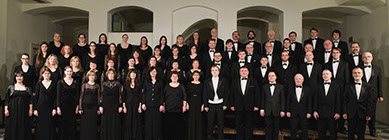
Kühn Choir of Prague and Marek Vorlíček, photo by Petr Dyrc
© NAVONA RECORDS LLC. ALL RIGHTS RESERVED.
Navona Records offers listeners a fresh taste of today's leading innovators in orchestral, chamber, instrumental, and experimental music as well as prime pieces of classic repertoire. Our music is meticulously performed by the finest musicians and handpicked to ensure the most rewarding listening experience.
223 Lafayette Road
North Hampton NH 03862
PRESS INQUIRIES
press (at) parmarecordings.com
603.758.1718 x 151
